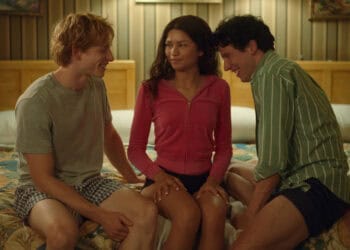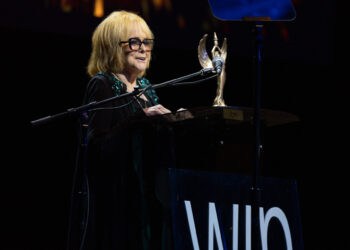About Jason Bourne
Matt Damon returns to his most iconic role in Jason Bourne. Paul Greengrass, the director of The Bourne Supremacy and The Bourne Ultimatum, once again joins Damon for the next chapter of Universal Pictures’ Bourne franchise, which finds the CIA’s most lethal former operative drawn out of the shadows.
The Cast
For Jason Bourne, Matt Damon is joined by the incredibly talented and sexy Alicia Vikander, Vincent Cassel and screen legend Tommy Lee Jones, while Julia Stiles reprises her role in the series. Frank Marshall again produces alongside Jeffrey Weiner for Captivate Entertainment, and Greengrass, Damon, Gregory Goodman and Ben Smith also produce. Based on the characters created by Robert Ludlum, the film is written by Greengrass and Christopher Rouse.
Interview with Alicia Vikander
About the Film
Almost two decades ago, a brilliant young soldier volunteered for an experimental special-ops program after he was told that terrorists killed his father. He was promised he could honor his family and country by evolving an already impressive intellect, deft agility and adaptable skillset into the unimaginable. It was all a lie.
Subjected to brutal training he doesn’t remember by people he couldn’t then identify, the elite-trained assassin who came to be called Jason Bourne was molded into a $100 million human weapon who, according to his designers, malfunctioned.
When Bourne tracked his makers to learn their end game, they tried to erase him and took away the only woman he ever loved. Once he found revenge, learned his real identity and what he believed was the goal of his creators’ campaign, Bourne felt a semblance of peace and vanished…for what he hoped was forever.
Once a new program is activated—one developed by a global power structure more intricate and duplicitous than in the period of superpowers from which Bourne was created—he is flushed out of hiding by an instantly malleable network that is more dangerous than any individual government. The singular goal of this power nexus is to manipulate terror, technology and insurgency to fit its end game. While his pursuers believe Bourne will come in for reconditioning if they deliver him what he most desires, the most elite weapon ever designed knows what his trackers cannot grasp: even broken soldiers defend the innocent from those with unchecked power.
To learn more about Bemer, contact:
www.garycarr.bemergroup.com
The Operative Returns
In the world of action choreography, chase sequences and intricate switchbacks, the Bourne films—with their innovative story and structure—have set a new standard for an entire genre. For almost ten years, audiences have demanded Greengrass and Damon reunite for another chapter that is equal parts intellect, espionage and action.
A lot has happened in the world since operative Jason Bourne went off the grid at the end of 2007’s The Bourne Ultimatum—and it’s precisely the passage of time that has allowed for his return. Filmmakers had long sought the precise confluence of socio-political events that would provide the iconic Bourne with the right global stage that could further his story, and these started to align in 2014.
Producer Frank Marshall
Producer Frank Marshall—who’s been aboard the Bourne team from the first film—says: “We finally came up with a story that is current and relevant to justify Bourne coming back. Paul, Chris, Matt and all the rest of us have been discussing these possible stories and finally, one hit. One of the things that most concerned us was not just having another movie, another sequel to the last Bourne, but having a shift in the modern world that was relevant…which would then inspire us into telling a new story.
“We all felt that the world has changed dramatically and inspired us to come up with a timely story that applies to what’s happening today,” he continues. “This series is special to me, because I was there at the start of that germ of an idea, where we took Robert Ludlum’s first book—it was a Cold War story at first—and made it come to life in a 21st century world. It’s exciting to me to be on the fifth one, and still have it be relevant and to know that filmgoers are still eager to see where Bourne is going to go.”
Producer Gregory Goodman
Producer Gregory Goodman says that what Greengrass and his longtime collaborator, Christopher Rouse, created in their screenplay was not only timely, it was propulsive: “I believe that waiting was a very good thing, because it gives the movie a chance to speak to much more serious issues and to be honest.”
WikiLeaks & Snowden
Producer Gregory Goodman continues; “A lot of the paranoia and concerns that were brought up in the previous films seems almost naïve compared to what we’re dealing with in a post-Snowden, WikiLeaks world—along with a sense that there actually is a secret government running separately from us. What I find compelling is that even the so-called bad guys have a valid argument. It’s clear to me as a citizen, separate from this film, that we as a society have difficult choices we need to make about balancing our need for security and safety with our need for transparency and privacy. This film touches on that, but in the context of an adrenaline-filled action picture.”
Matt Damon
On the enduring popularity of the character he brought to life, Matt Damon comments: “We love him just as much as everybody else, and we were leery of putting the cart before the horse and making another Bourne movie before we were ready with a good story—it was a case of waiting for the world to change a bit. Paul and I would talk constantly, and the one thing that I always said was that I’d do it if he would. We would talk about projects all the time, and we made another movie together in the interim. Every few months, it seemed like we would have a Bourne conversation, but we couldn’t seem to get anywhere until about 18 months ago.”
The obvious issue to tackle first was, “where has Bourne been all this time?” According to the time frame established in Ultimatum, the operative walked away at the end of 2004. “So what has he been doing for 12 years and what does his life look like?,” continues Damon. “That was the biggest question to answer, and once we got a bead on that, everything started to fall into place.”
Editor Christopher Rouse
Not only has Bourne been absent, but the world he left is a much different place than when we last found him. Greengrass’ fellow screenwriter, and longtime editor, Christopher Rouse—who won an Academy Award® for his editing work on The Bourne Ultimatum, expands upon Goodman’s comment: “At the heart of any Bourne film is a character who’s a patriot. He signed up to defend his country and was betrayed by the institutions in power that he believed in. Those are very palpable feelings in today’s world. If you look at the financial crisis and what happened with the NSA, I think some people feel they’ve been deceived by their government and are acting out.”
Blackbriar Program
The issues of balancing global privacy with state security were fascinating to Rouse and Greengrass, and it was important to the writing partners that Bourne be haunted by his actions from the last film. On Rouse: “Bourne had blown the whistle when he exposed the Blackbriar program at the end of Ultimatum, and that was an act that made sense to him at the time. Still, I’m sure it has caused him some conflict since then. He’s a man of conscience, and he’s been subjecting himself to a life of penance.”
Matt Damon Discusses Cyber Warfare
Without a riveting storyline to plug the character into, however, Bourne would have remained off the grid, cinematically and otherwise. Damon remarks: “The whole concept of this fourth arena of cyber warfare and what has happened with technology recently, that’s very much in the public consciousness—our digital life, our civil liberties, to what extent people are keeping tabs on us. Bourne finds himself in this new world.”
While the thriller touches on current political issues, certainly a sense of cynicism and weariness the world feels with entrusting people to run our world for us. Goodman explains: “The ensuing years that have elapsed have brought us to a very different place with the way we see the world and our place in it. There has been a lot of trepidation and concern about some of the choices our society has made on a global scale.”
Digital Espionage
Though clearly the continuation of the story of Bourne and his search for truth, this chapter behaves much more like a stand-alone one. Marshall says: “You immediately fall into Bourne’s previous world—one of espionage and spies, and now, today, with satellites, surveillance and easily accessible information, people are familiar with this world. When audiences understand the world that Jason is in, what he’s trying to do, they will be able to catch up quickly, even if they haven’t seen the previous films. And people know who Jason Bourne is will just want to see what his next move will be and go along for the ride.”
Matt Damon Discusses Fans
Damon says: “At the end of the day, the number one reason that we made the movie was because people wanted to see it. Every airport I’m in, or every time I’m walking down the street and somebody stops me, that’s the first question: ‘Are you going to do another Bourne movie?’ So it’s exciting on one hand, but there’s also a lot of pressure on the other, because you want it to be of a piece with the other films. We’re all extremely proud of the previous three movies, and we want this to fit nicely with them. We’re excited and anxious, and definitely feeling the pressure—but we feel like we know what it is that audiences like about these movies, and we are doing our best to deliver a good one.
He pauses: “I’m sure I’ll always be associated with this role, no matter what else I do—you do something four separate times in your career, and it’s going to follow you around. But I don’t mind being followed by this one, because I really like Jason Bourne.”
Julia Stiles
Parsons is once again played by the returning Julia Stiles, who relates something many don’t know about her character: “Originally, Nicky, at the very end of The Bourne Identity, was thrown up against a wall, breaking her neck. But, luckily for me, they re-cut it and 15 years later, here I am.
“When I got cast, I remember thinking—but I didn’t say this out loud—‘I’m too young to be in the CIA.’ I was 19 at the time,” shares Stiles. “So, in my mind, Nicky was initially very eager, almost a very good, dutiful assistant. The natural progression over time is that she became more and more jaded, particularly through her personal connection to Jason. She cares about him as an individual and knows what the program has done to his psyche and his life. When we leave her in Ultimatum, she has to go into hiding as well. That has changed her life drastically. I’m excited, with this incarnation, to be able to make Nicky rebellious, fearless, and angry about the whole agency. She has nothing and is sick of running. There is freedom that comes from having nothing to lose. So, she sets out to expose what the organization has been doing, no matter what the cost—because this will also expose her, and she’ll have to come out of hiding.”
Strong Female Lead
Goodman introduces us to the character who suspects Parsons is seeking out Bourne: “Heather is a young woman who went to Stanford and was recruited by many organizations. She could have chosen the private sector and made millions, but it’s clear she’s a smart person who’s made a specific choice about what matters in her life. It’s not just that she’s ambitious, she also wants to be effective; she feels she’s going to make her mark by bringing Bourne back in. We needed to cast an actor of some power, to be going up against Tommy; their relationship is definitely one of spirited conflict.”
An expert in counterinsurgency and drone strikes—and an operative who has high-value target experience—Lee asks to be point on this operation and promises to deliver Parsons and Bourne. From Athens to Berlin to London and Vegas, Lee tracks them across the globe. When she starts to believe that Bourne could be brought back in and reconditioned, she makes the same deadly mistake others before her have.
For Rouse, who has been with the series since the beginning, it was critical that he and Greengrass brought a strong, young female character to the world they’ve created. He reveals: “One of the tropes of the franchise is that Bourne’s a character who’s looking into the past and trying to understand his present and his future. So it was important to have a character that threw to the future. We wanted someone who didn’t carry the baggage of the past like a Dewey, who is one of the relics in the CIA—someone who was forward thinking and raised questions for Bourne.”
Alicia Vikander
Greengrass affirms: “That’s both in terms of skill set and also as part of the new generation. I’d seen Alicia in Ex Machina and The Danish Girl, and she’s fantastic. But in all honesty, I didn’t think she would do it. For me, when you’re first starting a film, the first part you offer is very important—it can be a reality check. So, I asked her to lunch.”
That meal proved to be quite a full-circle moment for the actress. Alicia Vikander states: “When Paul and I met, I told him something that he probably thought I made up expressly for our meeting. But, it was the truth! When I first came to London, I shared a flat with three girls, not far from where we wound up shooting in Paddington, actually. We were so broke that we shared a wardrobe; we shared beds. On Sundays, when we didn’t have enough money to go to the pub, we would just ask, ‘Should we just go watch Bourne?’ And that’s what we did. We just watched it over and over. After I had lunch with Paul, my old roommates were the first ones I called.”
On what so resonated with her obsession with the previous Bourne films, Vikander shares: “Watching most spy films growing up, I had seen a certain way of what that genre was like. Suddenly, I was faced with something that was completely new, and I loved that I found myself thinking, ‘What if Bourne actually exists? What if he is actually running out in the streets?’ I loved that you wanted it to be true. I appreciated the integration of the social and political aspects, making it an intelligent movie, while keeping it a popcorn franchise and all of the fun and scale that that means.”
Quite soon, Vikander was one of the guys on the Jason Bourne production. “Working with Paul,” she reflects, “well, it feels like the system is very much in place. There were a lot of boys on the set. There was a lot of very technical dialogue to learn, and that was a bit of a struggle. But as soon as I overcame that, I started having a lot of fun.”
Matt Damon Discusses Alicia Vikander
Matt Damon commends that, amidst the intricate backstory and long-term friendships fused over the three previous films—Vikander and Jones were incredible additions to the family. He says: “Alicia brought this whole element of youth to the story, and Tommy Lee is just a legend. Essentially, these stories are all about the prodigal son returning in rage and frustration and facing his father. If you look at the trilogy, they follow that narrative arc. It’s now revealed that there’s a very deep connection between Tommy Lee’s character and mine. There’s a history that shakes Bourne to his core, and there’s a reckoning that needs to take place.”
Tommy Lee Jones
This story thread also ties Dewey and Heather together. Tommy Lee Jones reveals: “You have some idea that Dewey’s been a mentor for her as her career has developed. And like with any child, certain resentments of the parent develop. There’s a parallel there with both the characters of Jason Bourne and Heather Lee. That’s one of the things they have in common—a bad daddy.”
Ato Essandoh
It was the more visceral aspect of the franchise that attracted Django Unchained’s Ato Essandoh to the part of operative Craig Jeffers, deputy to Dewey’s director. Essandoh discusses his part: “What I love about this series is that it asks, ‘How do you think yourself out of impossible situations?’ Well, Jason Bourne can do that. It’s realistic, gritty, and I love the fighting. It wasn’t just bang, pow, smash. It felt like grappling…how a fight would actually happen.”
Discussing his real-life agency counterparts—and the tough choices they must make every day—Essandoh offers: “There’s a lot of emotion inherent in heading into obscenely dangerous situations, but there’s also a lot of compartmentalizing that emotion so you can do your job. I think that if you know what your cause is, if you know what your mission is, then you have to convince yourself—rightly or wrongly—that what you’re doing is for the good of the people. If you can convince yourself of that, you can do just about anything.”
Alicia Vikander Discusses the Film
Vikander finds a commonality in the players on both sides of the struggle when she remarks: “The general thing with all the characters in the Bourne movies is that they’re all very, very driven and with that, extremely lonely. They all are by themselves, working very hard—they almost have a tunnel vision for whatever drives them. I believe that makes them unable to trust people and, without that, you wind up quite alone.”
Greengrass asserts that his cast made its work look deceptively simple: “These roles look quite easy from an acting standpoint, but they’re not. They’re an immense 360-degree performance challenge. These franchise movies are worlds, and moviegoers love the world of Bourne. Characters that come in have got to play their part in giving the audience this privileged view. So an actor in this film has to find his or her character and nail it, and then hone that relationship with Bourne. Because, in the end, everybody is chasing Jason Bourne. Layered on top of that is an amount backstory, along with the physicality of the acting. Amidst all of that, you have to land it in the sweet spot or it doesn’t play. It’s a huge challenge, and this cast were all up for it.”











